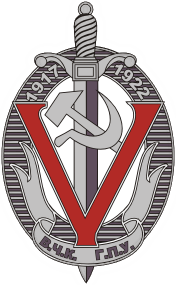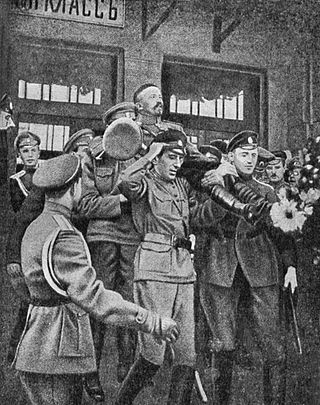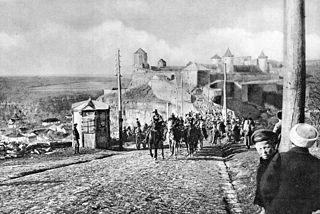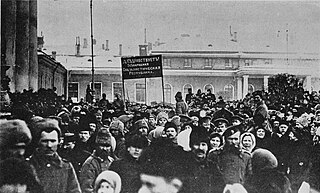
The All-Russian Extraordinary Commission, abbreviated as VChK, and commonly known as Cheka, was the first of a succession of Soviet secret-police organizations. Established on December 5 1917 by the Sovnarkom, it came under the leadership of Felix Dzerzhinsky, a Polish aristocrat-turned-Bolshevik. By late 1918, hundreds of Cheka committees had sprung up in the Russian SFSR at the oblast, guberniya, raion, uyezd, and volost levels.

The October Revolution, officially known as the Great October Socialist Revolution in the former Soviet Union, also known as the Bolshevik Revolution, was a revolution in Russia led by the Bolshevik Party of Vladimir Lenin that was a key moment in the larger Russian Revolution of 1917–1923. It was the second revolutionary change of government in Russia in 1917. It took place through an armed insurrection in Petrograd on 7 November 1917 [O.S. 25 October]. It was the precipitating event of the Russian Civil War.

The Russian Revolution was a period of political and social revolution that took place in the former Russian Empire, begun during the World War I. This period saw Russia abolish its monarchy and adopt a socialist form of government following two successive revolutions and a bloody civil war. The Russian Revolution can also be seen as the precursor for the other European revolutions that occurred during or in the aftermath of World War I, such as the German Revolution of 1918–1919.

The Russian Civil War was a multi-party civil war in the former Russian Empire sparked by the overthrowing of the social-democratic Russian Provisional Government in the October Revolution, as many factions vied to determine Russia's political future. It resulted in the formation of the Russian Socialist Federative Soviet Republic and later the Union of Soviet Socialist Republics in most of its territory. Its finale marked the end of the Russian Revolution, which was one of the key events of the 20th century.

The Kornilov affair, or the Kornilov putsch, was an attempted military coup d'état by the commander-in-chief of the Russian Army, General Lavr Kornilov, from 10–13 September 1917, against the Russian Provisional Government headed by Aleksander Kerensky and the Petrograd Soviet of Soldiers' and Workers' Deputies. The exact details and motivations of the Kornilov affair are unconfirmed due to the general confusion of all parties involved. Many historians have had to piece together varied historical accounts as a result.

The Latvian Riflemen were originally a military formation of the Imperial Russian Army assembled starting 1915 in Latvia in order to defend Baltic territories against the Germans in World War I. Initially, the battalions were formed by volunteers, and from 1916 by conscription among the Latvian population. A total of about 40,000 troops were drafted into the Latvian Riflemen Division. They were used as an elite force in the Imperial and Bolshevik armies.

The Moldavian Democratic Republic, also known as the Moldavian Republic, was a state proclaimed on 15 December [O.S. 2 December] 1917 by the Sfatul Țării of Bessarabia, elected in October–November 1917 following the February Revolution and the start of the disintegration of the Russian Empire.
The Separate Corps of Gendarmes was the uniformed security police of the Imperial Russian Army in the Russian Empire during the 19th and early 20th centuries. Its main responsibilities were law enforcement and state security.

The Oberste Heeresleitung was the highest echelon of command of the army (Heer) of the German Empire. In the latter part of World War I, the Third OHL assumed dictatorial powers and became the de facto political authority in the Empire.

The Allies, or the Entente powers, were an international military coalition of countries led by the French Third Republic, the United Kingdom of Great Britain and Ireland, the Russian Empire, the United States, the Kingdom of Italy, and the Empire of Japan against the Central Powers of the German Empire, the Austro-Hungarian Empire, the Ottoman Empire, and the Kingdom of Bulgaria during the First World War (1914–1918).

The Moscow Choral Synagogue is one of the main synagogues in Russia and in the former Soviet Union. It is located in central Basmanny District at 10 Bolshoy Spasogolinischevsky Lane, close to Kitai-Gorod Metro station. Chief Rabbi Adolf Shayevich is its spiritual head.

The Romanian Front was an army group level command of the Imperial Russian Army and the Romanian Army during the First World War.

Vladimir Viktorovich Sakharov was a Russian general of the cavalry who served in the Russian Imperial Army. In an army career lasting from 1869 to 1917, he served in the Russo-Turkish War of 1877-1878, the Russo-Japanese War, and World War I.
Joseph Stalin was the General Secretary of the Communist Party of the Soviet Union's Central Committee from 1922 until his death in 1953. In the years following Lenin's death in 1924, he rose to become the leader of the Soviet Union.

The Chief Rabbi of Russia is the leader of the Jewish communities in Russia since 1990. Currently there are two Chief Rabbis of Russia: Rabbi Berel Lazar of Chabad and Adolf Shayevich from the Congress of the Jewish Religious Organizations and Associations in Russia (KEROOR). The largest network of Jewish organizations is the Federation of Jewish Communities of Russia.

The Operation Faustschlag, also known as the Eleven Days' War, was a Central Powers offensive in World War I. It was the last major action on the Eastern Front.

Red Guards were paramilitary volunteer formations consisting mainly of factory workers, peasants, cossacks and partially of soldiers and sailors for "protection of the soviet power". Red Guards were a transitional military force of the collapsing Imperial Russian Army and the base formations of Bolsheviks during the October Revolution and the first months of the Russian Civil War. Most of them were formed in the time frame of the Russian Revolution of 1917, and some of the units were reorganized into the Red Army during 1918. The Red Guards formations were organized across most of the former Russian Empire, including territories outside the contemporary Russian Federation such as Finland, Poland, Estonia, Ukraine, and others. They were not centralized and were formed by decision of a local political party and local soviet members. By fighting to protect and extend the power of the Soviets, they aided the creation of a new state that would give "all power to the soviets": the Soviet Union.

The Russian Provisional Government was a provisional government of the Russian Republic, announced two days before and established immediately after the abdication of Nicholas II. The intention of the provisional government was the organization of elections to the Russian Constituent Assembly and its convention. The provisional government, led first by Prince Georgy Lvov and then by Alexander Kerensky, lasted approximately eight months, and ceased to exist when the Bolsheviks gained power in the October Revolution in October [November, N.S.] 1917.

The February Revolution, known in Soviet historiography as the February Bourgeois Democratic Revolution and sometimes as the March Revolution, was the first of two revolutions which took place in Russia in 1917.

















